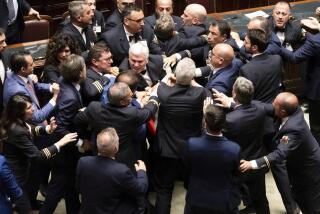Iraqi legislators spar over accord
- Share via
BAGHDAD — An attempt to open debate on a pact allowing U.S. troops to stay in Iraq through 2011 degenerated into a raucous yelling match in parliament here Wednesday, casting doubt on Iraqi and U.S. officials’ hopes of easy passage.
Iraqi legislators were to try again today to discuss the security agreement, but it was clear from Wednesday’s session that political factions were more divided on the issue than when it was first given to parliament members Monday.
The discord does not bode well for passage by Tuesday, when lawmakers are expected to begin a nearly monthlong break. If the pact is not approved by year’s end, it will leave U.S. forces without legal standing to be in Iraq come Jan. 1.
Lawmakers loyal to Shiite Muslim cleric Muqtada Sadr, who wants U.S. forces to leave immediately and opposes the pact, accused security guards in parliament of roughing up one of their legislators when he tried to prevent debate.
“Terrorism has entered the hall of the parliament,” a Sadr bloc lawmaker, Aqeel Abdul Hussein, said after lawmakers spilled out of the meeting hall without discussing the agreement.
Lawmakers from three other political blocs joined the Sadr loyalists in condemning what they called bullying by bodyguards inside parliament, and they pledged to boycott further sessions.
The groups don’t have enough combined seats to prevent a quorum in the 275-seat legislature, assuming enough lawmakers showed up, but their action will deny Prime Minister Nouri Maliki the broad-based backing he needs to avoid deepening rifts that have hobbled efforts at reconciliation.
Maliki also faces provincial and national elections next year and cannot afford to be seen as backing a plan overly favorable to the Americans, as foes have described it.
U.S. officials also are pushing for passage of the Status of Forces Agreement, or SOFA. In Washington, Secretary of State Condoleezza Rice, Defense Secretary Robert M. Gates and Marine Gen. James E. Cartwright, vice chairman of the Joint Chiefs of Staff, were briefing members of Congress on the plan Wednesday.
If Iraqi lawmakers reject the agreement, it would be an embarrassment to U.S. officials, who spent nearly nine months in negotiations with Iraqi officials and made several concessions to win Maliki’s backing. When Maliki’s Cabinet approved the pact by a 27-1 vote Sunday and passed it on to parliament, U.S. officials had hoped that was a sign that Iraq’s divisive factions could rally behind a common goal of Iraqi sovereignty to support the deal.
The U.S. concessions included agreeing to a firm deadline for the withdrawal of American forces: Dec. 31, 2011. The United States also agreed to pull its combat troops out of Iraqi cities, towns and villages by the end of June.
Some analysts say the parties that rallied behind the Sadr bloc were doing so out of self-interest before Jan. 31 provincial elections, when voters might shun politicians deemed sellouts to the Americans.
“I think the Sadrists are the main party opposing the U.S. presence, in any form and for any length of time. Anyone else who might vote against the SOFA now is probably just trying to show his nationalist self before the elections, knowing that his vote won’t make a difference and the SOFA will pass anyway,” said Joost Hiltermann of the International Crisis Group, a Brussels-based think tank.
Politicians from the Sadr bloc, who number about 30 in parliament, made clear from the start of the televised session that they would do everything possible to prevent the bill being debated. As Speaker Mahmoud Mashadani attempted to open discussions, legislators shouted at him repeatedly.
“We must act civilized in front of the world! Stop this chaos!” Mashadani yelled, shaking his hand at a Sadr lawmaker who continued shouting above him. “We can’t go on like this!”
Lawmakers from other blocs joined in the verbal chaos, some pleading for restraint, others siding with the Sadr group.
U.S. negotiators say there is no alternative, except extending the United Nations mandate that authorizes the U.S. presence here through Dec. 31 or ceasing all U.S. military operations in Iraq as of that date.
The pact “is the best current available option,” said Khalid Assadi, a lawmaker from Maliki’s Islamic Dawa Party, which has been backed by several other Shiite groups and by Kurdish parties.
“If we compare the agreement to the [U.N.] Security Council order extending the permission for the presence of [foreign troops], the agreement is better for the Iraqi people because it has fixed dates for withdrawal,” Kurdish lawmaker Muhsin Sadoun said.
--
Times staff writers Usama Redha and Caesar Ahmed and a special correspondent contributed to this report.
More to Read
Sign up for Essential California
The most important California stories and recommendations in your inbox every morning.
You may occasionally receive promotional content from the Los Angeles Times.











